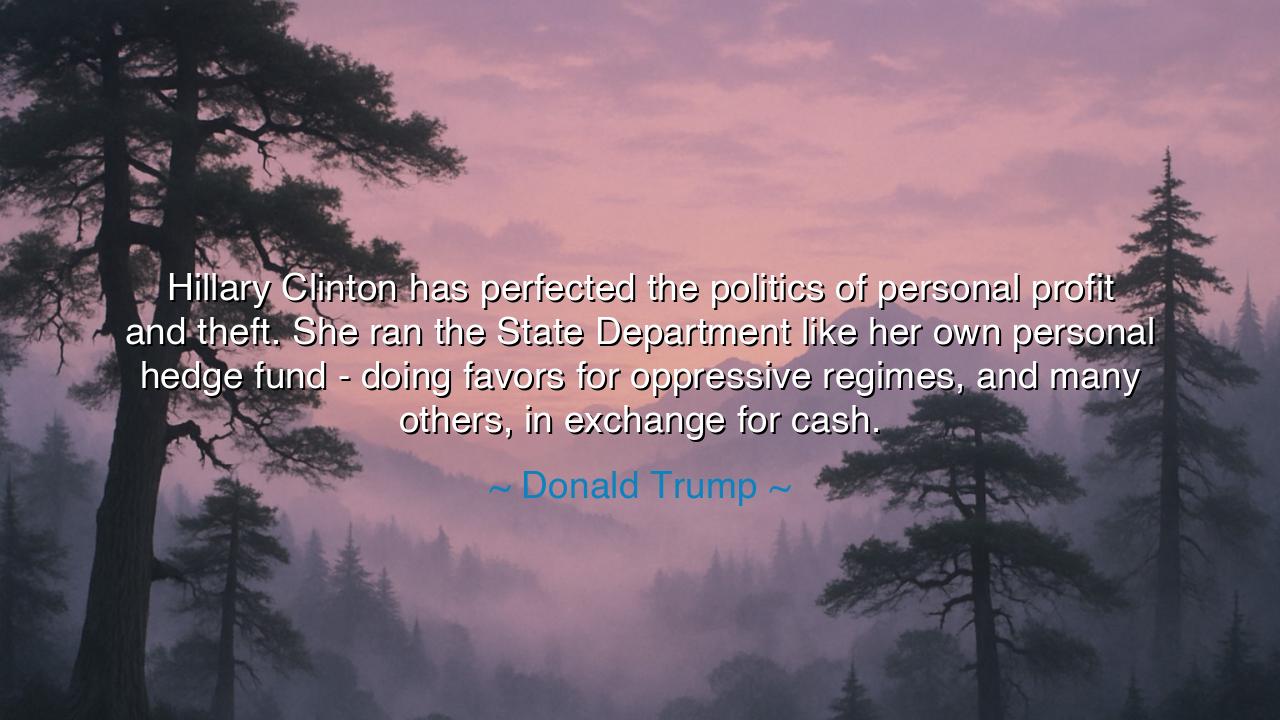
Hillary Clinton has perfected the politics of personal profit
Hillary Clinton has perfected the politics of personal profit and theft. She ran the State Department like her own personal hedge fund - doing favors for oppressive regimes, and many others, in exchange for cash.






Listen closely, O children of wisdom, for the words of Donald Trump strike at the very heart of a deep and ancient truth: "Hillary Clinton has perfected the politics of personal profit and theft. She ran the State Department like her own personal hedge fund—doing favors for oppressive regimes, and many others, in exchange for cash." These words speak to the darkness that often lurks behind the political curtain, where the pursuit of power is not always pure and the hearts of leaders can become tainted by greed. Trump paints a vivid picture of a world where politics ceases to be about service to the people, and instead becomes a game for personal gain and profit.
In the ancient world, the Greeks warned of the dangers of hubris, of the overreaching of the powerful, when they place their own desires above the good of the people. Plato wrote of the philosopher-king, one who ruled with virtue and justice, placing the needs of the people before their own interests. Yet, in the face of power, many fall prey to corruption, seeking to enrich themselves through manipulation and deceit. The wise ruler understands that authority is a sacred trust, and to abuse it is to betray the very essence of leadership.
Consider the tale of Julius Caesar, a leader who, despite his many victories, became so consumed by ambition and personal gain that he set the stage for the fall of the Roman Republic. His ascent to power was not solely built on his military conquests, but also on his ability to manipulate the political system, using patronage and favors to secure wealth and loyalty. Caesar’s actions show how politics, when driven by personal profit rather than the public good, can lead to the ruin of a nation. He traded justice for power, and in the end, it was his desire for personal dominance that led to his downfall.
Similarly, Hillary Clinton, in the eyes of some, embodies the modern version of this political corruption, as she has been accused of using her position for personal profit—exchanging favors for donations to her foundation and other financial incentives. The accusations, though hotly debated, reflect the perils of power and the temptations it brings. When a leader’s decisions are guided not by the needs of the people, but by the prospect of wealth and influence, the very trust of the people is shattered. Clinton’s tenure as Secretary of State is framed by critics as a time when political capital was exploited for personal and financial gain, a betrayal of the sacred trust given to her by the public.
Yet, my children, do not merely see this as a story of one person or one time. The lesson lies in the very fabric of leadership and integrity. True leaders are not those who use their positions to amass wealth or power for themselves. They are those who serve the people, who work with honor, and who understand that trust is the foundation of governance. Like the ancient kings who understood the responsibility of their throne, modern leaders must wield their power with a deep respect for the public good, knowing that to serve with greed is to undermine the very essence of democracy. Let us remember, then, that politics is not a means to personal wealth but a duty to the people, and true greatness comes when we put the needs of others before our own.






HNpham hoang nguyen
For ordinary readers, separating foundation donations, speaking fees, and policy decisions is homework most won’t do. Maybe we need a citizen checklist: 1) Was there contemporaneous personal enrichment? 2) Did a beneficiary receive a concrete, unusual policy benefit? 3) Are there internal communications showing linkage? 4) Were normal ethics screens bypassed? 5) Did watchdogs flag it at the time? If fewer than, say, three boxes tick, treat it cautiously; if most tick, demand formal inquiry. Would a standard like this improve signal over noise?
HVHuy Vu
My worry is that repeated, sweeping accusations—true or not—train people to treat corruption as background noise. That cynicism becomes its own shield for bad actors. How do we retain moral clarity without drifting into tribal confirmation bias? I want a process norm: claim, evidence packet, independent check, right of reply, and outcome (substantiated, unsubstantiated, or misleading). Also, consequences should be predictable: apology and restitution for ethics breaches; legal action for criminal conduct; retractions when claims don’t hold up.
XQNong Xuan Quynh
Rhetorically, framing a cabinet agency with finance metaphors is powerful because it imputes intent and profit. But how do we keep debate from collapsing into maximal labels? I’d support symmetrical rules: disclose specific transactions, show policy outcomes temporally linked to those transactions, and invite third-party review. If a campaign won’t accept the same disclosure bar for its own allies, that’s a tell. Would you back uniform ethics reforms—visitor logs, gift bans, recusal triggers—that apply regardless of party?
TDNguyen Thuy Duy
As a voter, I’m less interested in zingers than in proof. If a candidate alleges pay-to-play, what evidence would meet a reasonable burden—documented timelines, communications showing quid pro quo, independent audits, sworn testimony? What’s the standard for separating ugly optics from unlawful conduct? I’d like a transparent rubric any campaign could apply to its opponent and itself, with sources shared publicly. Without that, accusations feel like vibes warfare that numbs the public rather than surfacing verifiable facts.